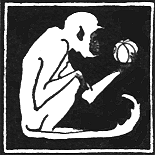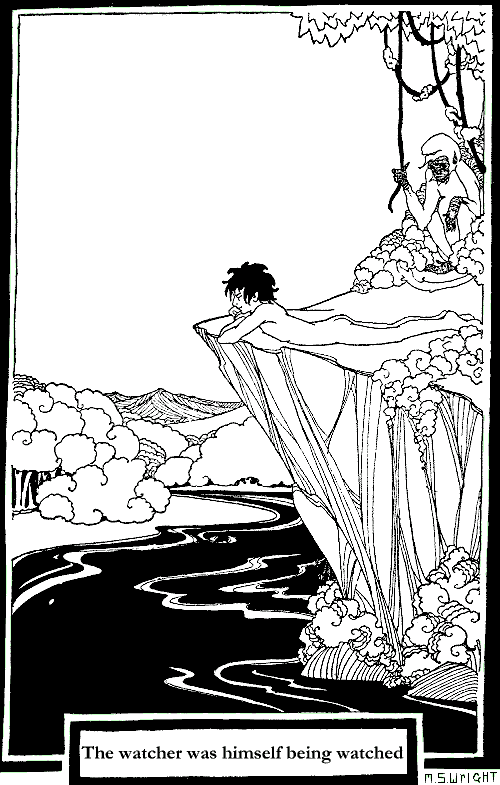 |  |
Wild at Heart Homepage | Contents | Previous Chapter
CHAPTER XIII
BY THE RIVER
1

A mile away; down by the river Nanga was watching for his enemy. The sun bathed his body till he glowed again; the song of the water, sobbing into a deep pool at the foot of his rock, was in his ears--no other sound. And on any other day he would have slept where he lay, till evening. Often had he lain just as he was now, prone, with his chin on his hands, in that very place, and had slept the sun round. But no sleep now.
For three miles, this way and that, he could see the river. First, not a hundred paces above him, the long shadows of the ford, a broad ribbon of sheer silver. Above them, black mysterious water between high cliffs, with a jagged rock protruding here and there like the snout of a monster crocodile. Yet above, a long series of turbulent pools and foaming falls, culminating in the white cascade that marked the gate of the hills. Faintly, from where he lay, he could hear the roar of it. But of the river above only the ford needed watching.
Immediately below him, on the same side, was the belt of sheeshum wood in which he had startled the blue bulls the evening before, any tree of which might conceal the tiger’s approach to that calm lower water which widened and widened till it was swallowed in the green mist of the fens. On the opposite bank, and within hail, was the lost garden, the only home he had known. His eyes roved incuriously over the familiar shapes of the trees that girdled it, but did not linger, for his enemy filled his mind.
How would he come? Where would he break cover? What strip of the yellow sand would darken under his shadow, what patch of silver break and shiver at his plunge?
Up and down, up and down, Nanga’s eyes roved, eager to learn the landscape so that he could note that minute change in it that would betoken the presence of tiger where before tiger was not. One more shadow among the shadows; one new rock in a clump of similar rocks; a dark lump near the base of a tree trunk, so like the other lumps; a flicker of a tail in the grass; in the brown bank a tawnier patch--such little things mean tiger. Such little things, to be seen, demand keen eyes. But, though his eyes were never still, he never once moved his head. And no tiger could have chosen a better background than that mellow rock, or have melted better into it.
The blue bulls, sunning themselves on the fringe of the sheeshum, their sleek backs shining in the sunlight as if polished, glanced often at the big rock, but saw nothing strange about it. Truant buffaloes from the village wandered lazily up the shallows, leaving dull streaks in the silver water and plowing up the neat sand, but they were blissfully ignorant of the face that frowned on them from the rock for thus disturbing the landscape. Otters are keen-eyed. Yet a family of them--father and mother and three little ones--played and dived and skirmished in the very shadow of the rock for an hour or more, and noticed nothing. Even men came--a party of woodmen, with their bundles and hatchets, hurrying for the hills. But, though they glanced nervously up- and down-stream--for had they not just heard the news in the village?--their eyes rested on the big rock with confidence. That at least, they seemed to say, was solid and honest and reliable.
Yet, for all that, the watcher was himself being watched.

Well above Nanga, and directly behind his head, sat the one creature whose eyes were keener than otters’ eyes--a langur ape, grey-bodied, black-faced, whiskered. Very still he sat, a solitary sentinel, and by some strange process so mingled himself with the grey-green lichen on the roots and the stones, with the tangled creepers that screened the cliff, as to be utterly inconspicuous.
He had been the flank-guard of the troop as they had skirmished up-river for the hills, where certain berries were reported ripe; and he had looked down from above and had seen the truant, lying prone and apparently asleep.
This was more interesting than berries. Berries could wait. So he had given the signal to muster and had hopped down to a front seat in the show.
Other anxious heads occasionally popped over the edge of the cliff to steal a look, but the main body of the apes was behind, sitting in the trees and holding a council of war.
They had missed their brown brother; for, if not actually one of themselves, he had at least served as a mark of distinction. No other troop had ever numbered among its members a child of man. And now that child of man had seceded.
Now, none are more jealous of secession than the langur apes. Its punishment is death, death by flaying, death by tearing to pieces; and the truant was at their very feet, asleep.
But the apes, in spite of a reputation for being impetuous as individuals, collectively never act on the spur of the moment. Hence, the subdued council of war among the trees; hence, too, the patient immobility of that single sentry, peering anxiously through the creepers. They would act--yes. But upon due consideration.
The count was heavy. The brown brother, scared apparently by the tiger (whom all apes, so long as they are up a tree, hold in supreme con tempt), had fled last evening like a mad dog, through the dusk, disturbing the whole jungle at drinking-time. So doing, he had evidently set man on the alert; for, when later in the night the foraging party had descended on the village, they had been immediately met by an outcry and driven home hungry. Nor was this all. In their flight they had actually encountered and passed by the truant, standing calmly and awaiting the very coming of man. Truant, indeed! Traitor, more likely--in league with man!
Such was the trend of their whisperings.
And now they had him at their mercy, asleep, in a trap. There was no escape for him, by land or water. He must die; must die.
Their teeth chattered. Their cold little fingers itched to be at him. Slowly the whispering ceased and the solemn ranks formed, as ape by ape they dropped from the trees. Slowly they crept up, fully two hundred of them, to the brink of the cliff.
The sentinel hopped on a pace.
Another took his place...
2
After the woodmen had passed, it seemed to Nanga that a strange lull came. Nothing living could be seen. The buffaloes were out of sight, wallowing in some pool; the blue bulls had retired into the shade; the otters had gone to sleep in their hole under the rock. Even the river seemed to have sobered. There was less sparkle, surely, a quieter note in its song; and a misty haze was flickering over the rocks.
Nanga’s body grew tense. Such times, he knew, tigers choose for slipping across the water. Men say that the tiger makes the lull, but he knew more truly that the lull serves the tiger. If it were coming at all,--and he had never once known it to lie up on the village side of the river,--now would be the time.
Suddenly, in the trees that fringed a deep pool below the ford, a sambar belled its one clear note. Then a flight of green parrots rose, eddied, and swooped downstream.
Something was afoot.
Silence once more. All agog, Nanga watched the place whence the deer and the parrots had fled. There was a half-submerged tree just at that spot, he knew, against which the water welled knee-deep.
This was a favorite drinking-place of sambar, and a run led down to it through the shade. At all times a place of many shadows; but now there was surely a new shadow, intrusive, not quite like the rest; a sly, a moving shadow of a head, slowly, slowly--
Ah! so he had come! After all, he had not dared to cross by the open ford. He had chosen the deep, dark water, and--Nanga’s face lit up at the sudden thought--tiger hated deep water. There, in that pool of all places, he, Nanga, to whom water was a second home, would have the advantage. If he could only drop from above, get the huge head under, keep it there, the struggles would soon cease. The lithe body would soon be limp and sink down, where the big fish lay among the roots of the trees. Now, now was his great chance!
He whipped round quickly, full of purpose, and--there was a big ape poised within a foot of him! Eyes red, teeth bared--he knew the signs, knew that there must be others behind. But there was no time to rise. Time only to roll over on his back and put up legs and hands to guard his vital parts, before they were on him.
The very air, then, was full of apes. They came down, chattering and mouthing their rage, in a great grey tide that covered the rock and overflowed into the water. The first that came he sent hurtling into the river with a broken neck, in company with half a dozen that overshot their mark. But there was no pause in the rush, for the cliff above was steep, and those behind were biting the backs of those in front, in their eagerness to get at him. And under that seething, brawling, mad mass Nanga lay on his back and kicked as he had never kicked before.
The hot stench, too familiar, maddened him; the incessant babble goaded him to fury. There was fur in his mouth, in his eyes, in his ears. He could neither see nor hear anything but apes, apes, apes; and they were packed so close that he had no space for the use of his best weapons--his hands and teeth. He could only kick. Wisely, he never tried to rise; and, with a snap and a snarl, many passed over him, overborne by the weight of numbers behind, and plumped into the pool. But there were always more to take their place, and those that had missed their foot ing only climbed up, dripping and furious, to renew the attack. Kick as he might, there could be only one end to it.
An arm was pinned; half a score of cold little hands clutched it, wrenched it back. Now the other arm; and a huge ape sitting on his chest, gibbering in his face. Now a leg; and the same little cold hands creeping, creeping--
Suddenly he felt himself lifted, then borne upward. The grey tide was surging up the face of the cliff for the woods, and he with it. The little fingers pressed harder now. The nails cut into his flesh. It was as if he were being lugged by an infinite number of close-set hooks, lugged rather than lifted, for the sharp rock was flaying his back and pounding his ribs. And all the time, close to his ears, like the flapping of leaves in an urgent wind, throbbed those breathless, gasping, stuttering little voices.
“With a will, brothers!” they seemed to say. “One heave more, and--over he goes! Under the trees with him now, and tear him! Tear him! Tear him!”
He knew that note, with its thrill of coming triumph; knew vaguely that, once under cover, they would set to work after their peculiar manner till not a shred of skin would remain to him, and leave him, skinless, to writhe in the sun. He knew--more, he actually felt--that last heave; the quick bustle over level ground; the chill of shade. He had a vision of trees, whirling between him and the far sky.
Then, a hundred hands came clutching...